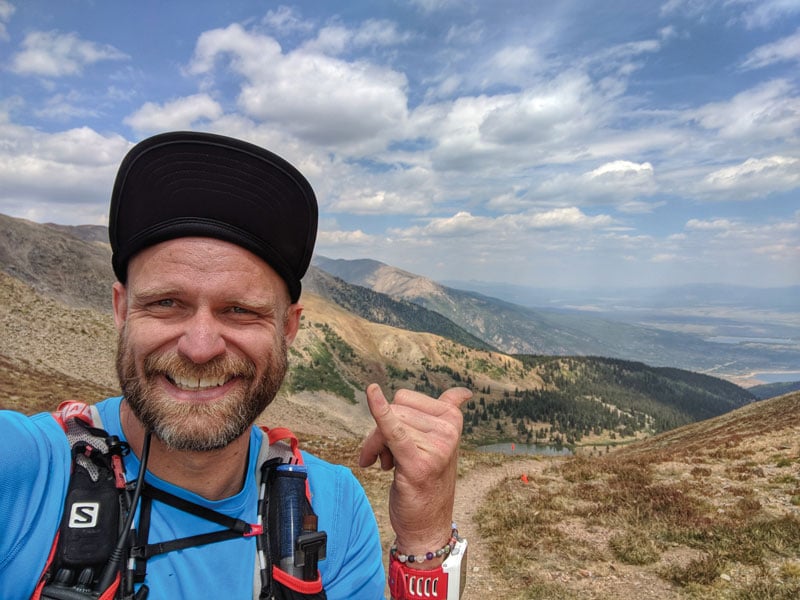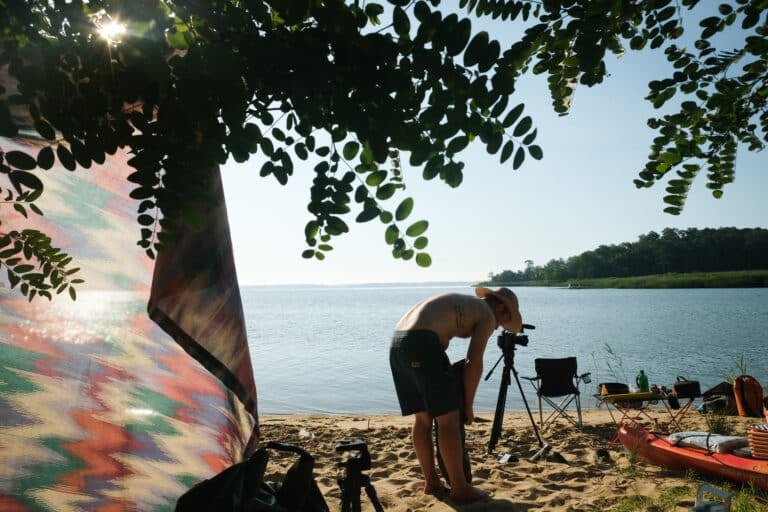How Kristopher Cargile turned his life around, one step at a time
We met on a cold, rainy day in a bustling, upbeat coffeehouse. Amid the hectic clanging, pain darkened his face. It was a stark change from the bubbly, funny, seemingly carefree trail runner who had been one of my constant companions at a six-day stage race.
Perhaps he regretted agreeing to tell his story again, this time without the buffer of adventure. But eventually, the words come out, halting at first, but then suddenly in a rush. This time, he left out no detail, and told the story of a man whose trail running adventures were punctuated by spectacularly heavy drug use, broken relationships, and dissatisfaction with his chosen careers as a day trader and programmer.
Is it worth a person’s livelihood, their sanity, their fragile relationships with loved ones—to recount the intimate details of such a fractured life?
Kris Cargile thinks so. Every opportunity he gets to tell his story, he continues to experience cathartic moments of clarity, of vision, of self-love, respect. And momentum.
I first met Cargile while running the TransRockies Six Day Stage Race. We started talking, as you do during sustained periods on trails in the backcountry. I told him my story, and while stampeding down steep, dusty trails in the Colorado Rockies, it was his turn to share what compelled him to be out on the trails that day. He told it. Casually. Flat. Even.
The magic of running or hiking through nature is that that any story you tell is told with the reassurance and comfort the trail gives you. The swooshing sounds of wind in the trees create a sonic reassurance that you are alive, that life continues its inevitable cycle of birth, rebirth, and death.
That’s exactly where Cargile found himself a few years ago, as he sat in a barber’s chair in Atlanta. That morning he had consumed a beer and a fairly large amount of cocaine, and minutes before he sat down for his haircut, he had run into the bathroom to do one final line of blow.
That’s all he remembers from the barber shop. There were moments where he had awoken briefly in the back of an ambulance, facing the EMTs that had jumped his heart back to life, but that is all.
The next time he was fully awake and conscious, he found himself in the ICU at Northside Hospital in Atlanta, his father hovering over his bed. He was fully intubated and tied to the hospital bed. A nurse came in and asked him if he knew where he was, along with the usual litany of questions one is asked after a cocaine overdose-induced brush with death. He knew exactly where he was, and why.
He learned that he’d had a seizure and had medically died, that his heart had stopped, and that he had gone into renal failure. But by an enormous stroke of luck, two EMTs happened to be on a lunch break nearby, and they saved his life.
Was this the moment of realization? Would this be the end of numerous ER visits, fights with worried parents and significant others?
Things didn’t change as quickly as he hoped. Eventually, though, Cargile launched into a frenzy of recovery and sobriety.
A martial arts studio was a short walk from his house. Cargile was intrigued with what he witnessed through windows, so he walked in and joined a class. He noticed that several students were part of an outdoor conditioning class trained on the trails of Sweetwater Creek and Pine Mountain. Cargile fell in love with the trails.
Through trail running, he began to heal his broken spirit. The trails allowed him to reassess and reconfigure his life, loosening the tight hold that his former life had once had on him.
While a few years ago, you may have found Cargile on the street, perhaps buying a vial of crack, right after pulling an all-nighter writing code for a big corporate company, on the verge of divorce from the partner who would encourage and augment his drug use with her own, spiraling into self-destruction, these days he is working on renovating and selling his house in Atlanta.
In April of 2018, Cargile’s demons came crashing back into him, eventually thrusting him into an intense relapse. He now freely admits that perhaps he should have done some work around his triggers: loss and fragmented relationships. But this reentry was short lived. Twice he ended up in the psychiatric ward, pleading his case, this time in front of a doctor who happened to recognize Cargile from some races he had done. Surprised to see him, the doctor issued an ultimatum: “Clean up or go to jail.”
The second time around, he acquiesced and checked himself into a rehabilitation facility, among doctors and lawyers working through their own healing. A month later, Cargile walked out, with a sharpened ability to discern which relationships he didn’t have use for and a renewed confidence in rebuilding his life.
Cargile continues to run in the North Georgia Mountains, his base for long trail running, mountain biking, and head-clearing adventures. Trail running has been essential to his journey of recovery. “The trail does something to me,” says Cargile. It offers solace and a sense of home.”








